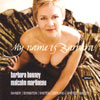My Name is Barbara
Gleaming soprano gets eponymous in a lovely Anglo-American recital
View record and artist detailsRecord and Artist Details
Composer or Director: Benjamin Britten, Aaron Copland, Roger Quilter, Samuel Barber, Leonard Bernstein, Charles T(omlinson) Griffes
Genre:
Chamber
Label: Onyx
Magazine Review Date: 8/2005
Media Format: CD or Download
Media Runtime: 62
Mastering:
Stereo
DDD
Catalogue Number: ONYX4003

Tracks:
| Composition | Artist Credit |
|---|---|
| (7) Elizabethan Lyrics |
Roger Quilter, Composer
Barbara Bonney, Soprano Malcolm Martineau, Piano Roger Quilter, Composer |
| (3) Fiona Macleod Poems |
Charles T(omlinson) Griffes, Composer
Barbara Bonney, Soprano Charles T(omlinson) Griffes, Composer Malcolm Martineau, Piano |
| Night |
Aaron Copland, Composer
Aaron Copland, Composer Barbara Bonney, Soprano Malcolm Martineau, Piano |
| (A) Summer vacation |
Aaron Copland, Composer
Aaron Copland, Composer Barbara Bonney, Soprano Malcolm Martineau, Piano |
| My heart is in the East |
Aaron Copland, Composer
Aaron Copland, Composer Barbara Bonney, Soprano Malcolm Martineau, Piano |
| Alone |
Aaron Copland, Composer
Aaron Copland, Composer Barbara Bonney, Soprano Malcolm Martineau, Piano |
| On this Island |
Benjamin Britten, Composer
Barbara Bonney, Soprano Benjamin Britten, Composer Malcolm Martineau, Piano |
| I hate music |
Leonard Bernstein, Composer
Barbara Bonney, Soprano Leonard Bernstein, Composer Malcolm Martineau, Piano |
| (4) Songs |
Samuel Barber, Composer
Barbara Bonney, Soprano Malcolm Martineau, Piano Samuel Barber, Composer |
Author: Patrick O'Connor
The title-song, and obviously no one could resist the idea, comes from Leonard Bernstein’s I Hate Music. This quirky song-cycle, with words by the composer, was first sung by Jennie Tourel, who gave it as an encore at the end of a recital with Bernstein accompanying. Tourel’s voice, a plush mezzo, was far away from Barbara Bonney’s gleaming soprano. Wisely, Bonney and Malcolm Martineau keep this jokey little sequence for late in their recital.
This is an eclectic, thoughtful collection. The most substantial item is Britten’s On This Island. Through several recordings by tenors (Pears, of course, Langridge, Tear) it may be forgotten that it was composed for a soprano and was first sung by Sophie Wyss in 1937.
The poems by WH Auden are heavy with symbolism and mystery, from the urgent, opening ‘Let the florid music praise’ through the swirling ‘Seascape’ and then the longest song, ‘Nocturne’, which is almost like a trial run for Britten’s later night-time evocations. The jazzy ‘As it is, plenty’ wraps up the cycle. This is a lovely performance, with Martineau bringing out all the little details in the accompaniment.
The three Griffes songs and the early Copland group are in similar mood: slow with images of restrained passion. In these, as well as the Quilter group with which she opens, Bonney relishes the high-lying phrases but at the same time is too often challenged by the difficulty of getting many words across. The four early Barber songs include his settings of Gerard Manley Hopkins’s ‘A nun takes the veil’ and Yeats’s ‘The secrets of the old’.
The recording inevitably favours the voice; the sequence ends up seeming like a soliloquy on life and love.
This is an eclectic, thoughtful collection. The most substantial item is Britten’s On This Island. Through several recordings by tenors (Pears, of course, Langridge, Tear) it may be forgotten that it was composed for a soprano and was first sung by Sophie Wyss in 1937.
The poems by WH Auden are heavy with symbolism and mystery, from the urgent, opening ‘Let the florid music praise’ through the swirling ‘Seascape’ and then the longest song, ‘Nocturne’, which is almost like a trial run for Britten’s later night-time evocations. The jazzy ‘As it is, plenty’ wraps up the cycle. This is a lovely performance, with Martineau bringing out all the little details in the accompaniment.
The three Griffes songs and the early Copland group are in similar mood: slow with images of restrained passion. In these, as well as the Quilter group with which she opens, Bonney relishes the high-lying phrases but at the same time is too often challenged by the difficulty of getting many words across. The four early Barber songs include his settings of Gerard Manley Hopkins’s ‘A nun takes the veil’ and Yeats’s ‘The secrets of the old’.
The recording inevitably favours the voice; the sequence ends up seeming like a soliloquy on life and love.
Discover the world's largest classical music catalogue with Presto Music.

Gramophone Digital Club
- Digital Edition
- Digital Archive
- Reviews Database
- Full website access
From £8.75 / month
Subscribe
Gramophone Full Club
- Print Edition
- Digital Edition
- Digital Archive
- Reviews Database
- Full website access
From £11.00 / month
Subscribe
If you are a library, university or other organisation that would be interested in an institutional subscription to Gramophone please click here for further information.




